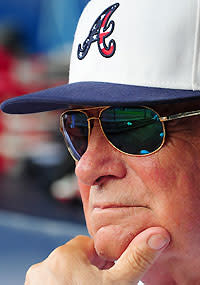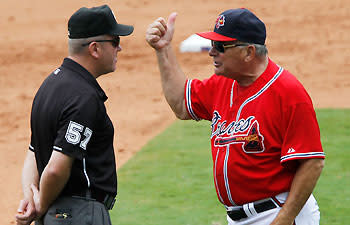Bobby Cox is fighting to the very end
PHILADELPHIA – Bobby Cox is doing this for himself, and he’s doing this for the Atlanta Braves, and he’s doing it for The Lifers. He is the last one standing. Lou Piniella quit his job managing the Chicago Cubs to take care of his ailing mother. Joe Torre is a lame duck with the Los Angeles Dodgers, forced out by age, family and cuckoo ownership. And that leaves Cox fighting for his playoff life with the Atlanta Braves, fighting for a happy ending.
He isn’t owed that. Baseball is in no one’s debt, not even a man who for the last 51 years has spent damn near every day between February and September – and plenty of Octobers – at ballparks. He spent time in the boonies and in the big leagues as a player, then went the same route as a manager. He is just like Piniella and Torre, not drawn to the game as much as married to it.
So even if the plan to retire after this season is of the 69-year-old Cox’s own volition – even if, unlike a real marriage, the union between a man and his silly game must eventually end – it is nonetheless surprising. Because there are no irreconcilable differences, no impetus for the divorce.
Bobby Cox still loves baseball, and baseball still loves him.
“It’s going to be hard,” he said Tuesday. “You miss this. You miss everything about it.”
He was looking out of the visitors’ dugout at Citizens Bank Park and doing his best to savor the moments that, after five decades, still haven’t turned monotonous: the teammates ribbing each other during stretching, and the beauty of coaches using sleek fungo bats to hit ground ball after perfect ground ball, and the faint smell of charred wood when a bat meets ball and sends it over the wall. What freshly mowed grass and popcorn and peanuts are to the casual fan the minutiae is to Bobby Cox.
Jason Heyward(notes) walked by and broke Cox’s concentration. “Hey, skip,” he said. Cox patted the 21-year-old on the back.
“It’s things like that …” Cox said, and though he didn’t finish the sentence, the implication was obvious: Players such as Heyward, so young and talented, so good as ballplayers and people, who made the 51 years – the birthdays missed and the holidays forsaken and the moments neglected – worth it, and who make the prospect of life without baseball so frightening.
There will be nobody to pat on the back, no 0-for-4s to comfort, no pitcher to tell, after he waddles to the mound for the ball, that he did well. He has managed the Braves for 20 years now, which, in modern times, is as impressive as Connie Mack’s 50-year tenure managing the A’s. This is what he knows. This is all he knows.
For someone who is surrounded nightly by tens of thousands of people and shares a clubhouse with another 50, Cox’s life – any manager’s life – is solitary. His head collates scenarios. The game necessitates decisions. Many are correct. Some aren’t. He suffers each of those. It is the sort of existence that challenges a man, the sort that, too, drives one mad.
The Braves lost their second consecutive game to Philadelphia on Tuesday night. Two months ago, they were seven games ahead of the Phillies. Today, they’re five behind Philadelphia. The National League East is all but lost. Now the Braves are trying to hold off San Francisco and San Diego and Colorado for the wild card, and Cox is not doubting them – he doesn’t do doubt – because he knows that is an emotion not afforded successful managers.
Following the game, Cox leaned back in his chair and sucked on a long maduro cigar. He’s about to give up his greatest vice. No sense in abandoning another. He tried to reconcile the night. His rookie pitcher, Mike Minor(notes), was a mess, and in the first game, the Braves’ starter, Brandon Beachy(notes), was making his major league debut. Not exactly the sort of 1-2 punch to bring in against the league’s standard bearer.
And yet it was OK, Cox said. The Braves, he said, need to start “focusing on winning a game.” That was that.
“You worry about everything in this game,” Cox said as he sat on the bench four hours earlier. “You just don’t let it show. That’s the big trick. I don’t know how you learn to do it. You just do it. I try to be upbeat every single day. Every day.
“Being around the guys, and once the game starts. The game action – God, I’m going to miss that. Even though it’s pressure ridden, it’s fun. If that’s possible.”
It is. It must be. Otherwise, Cox wouldn’t still be here, and he wouldn’t vow to watch all the Braves games on TV next season, at least the ones when he’s not at the ballpark. He’ll do some traveling, too, he said – to see Braves minor leaguers, shake some hands, continue his relationship with the organization to which he delivered 14 consecutive division titles.
So this isn’t a divorce as much as a separation, and he damn sure doesn’t want it to happen before the second week of October, when the playoffs begin. For all his success – those division championships, his 2,499 victories and, sure, his record 158 ejections – Cox still has just one World Series ring. This is a team capable of winning him another, and one with so much young talent that if he stuck around for another year or two or three, he might win another.
“I can’t,” Cox said. “I mean, Lou’s done, I guess. Joe’s thinking about it. Sparky Anderson is gone. The Earl [Weavers] are gone. The [Gene] Mauchs. There aren’t many of us left.
“This is it.”
He’s got 10 games left to delay the inevitable, 10 games to do it for the Braves, for The Lifers and, most of all, for himself.


